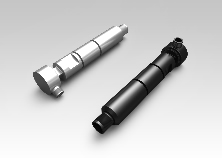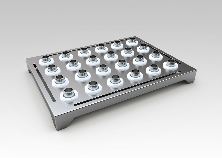Demagnetizers in line, installed in automated processes with parts transferred with robot:
- Demagnetization of single parts
- Simultaneous demagnetization of several parts
- Demagnetization of parts placed in washing or transport containers
The Electronic impulse demagnetizers, installed in automated processes with part transfer with robots/mechanical arms, can be designed to be adapted for different configurations. Possibility of demagnetizing the single part, or more parts at the same time. These models can also be designed to demagnetize the parts placed inside washing or transport baskets. Depending on the parts to be demagnetized, the cycle time and the type of robot clamps, it is possible to design made-to-measure solutions according to the customer’s requirements. Easy operation thanks to the exchange of signals between the demagnetization electronic control units and the line.
Example of operation:
- The demagnetization coil is free (no part presence) => enabling signal for part loading;
- The robot positions the part on the demagnetization coil;
- The electronic detects the presence of the part and releases the demagnetization impulse;
- The electronic provides the process end signal => enabling signal for part unloading;
- The robot unloads the demagnetized part and the process continues
The communication signals between the electronic and the line can vary according to the specific application.
Characteristics and Advantages:
- Demagnetization of the single part or more parts together
- Demagnetization of parts placed in a container
- High productivity
- Minimum energy consumption (< 150 W)
- Easy installation
- Almost zero maintenance
Technical data required for a quote:
- Part geometry
- Minimum and maximum part dimensions
- Demagnetization of the single part or parts placed in a container
- Dimensions of the container (L x W x H)
- Material of the container
- Positioning of the parts inside the container
- The cycle time (parts/hour);
- Working hours/day
- Description of the robot process
- Description of the type of clamping
- Minimum residual magnetism required
Applications:
|












